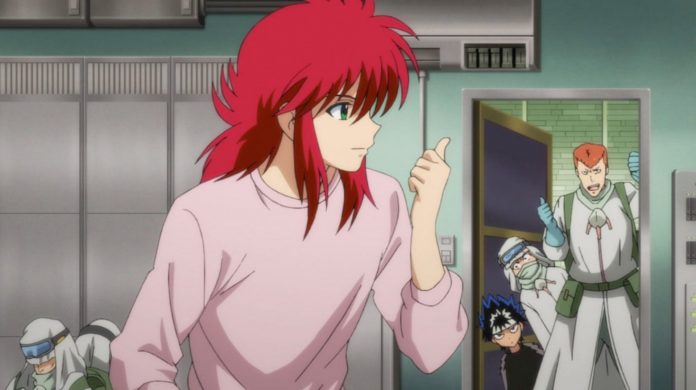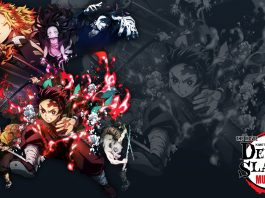The four boys of Team Hakusho need little introduction. Yusuke, Kuwabara, Hiei, and Kurama. Fan of the series often cite this core friendship as one of, if not, the most universally enjoyable parts of the series. However, I’ve seen little discussion of what aspects really make the team shine as well as they do.
For the four leads of Hunter x Hunter what unites them was made more explicit in the narrative and themes of the work. They’re united by the desire to improve, by genuinely caring hearts, and by unrelenting desire to follow their passions. Team Hakusho remains united by similar threads so closely interlinked that I hadn’t even thought about how similar in effect all for characters really are.
Team Hakusho is linked by the interplay between friendship, duty, and desire for self-determination. Each character acts as a foil for the other, naturally being complementary and strengthing the group dynamic to a mirror shine. Yusuke and Hiei, in my eyes, are both fairly straight forward foils that are easy enough to see. Both born into demon hood, both start off as initially alienated, both learn the value of connection, and both learn the value of punching up and not down (Yusuke through a love of martial arts and Hiei after visiting his homeland).
Kuwabara and Kurama have a similar dynamic that’s less immediately visible but works in a similar way. Both were born into humanity, intrinsically value connection as opposed to their counterparts, but most importantly both struggle with their identity and will as a result of being them being so externally defined as opposed to internally like Yusuke and Hiei. What do I mean by that?
Let’s start with Kuwabara, is he truly the apex of masculinity that viewers build him up to be? Yes and no. I think the sole ideal character ToGODshi created to be everything he represents is Ging Freecs, in that light, I see Yusuke and Kuwabara as two halves of a whole.

Yusuke struggles with his own self-determination, but Kuwabara, in contrast, has no will of his own. He’s defined completely externally by his relationships with others. If you pay close attention to how Kuwabara is framed, he is almost never actually alone. He’s always either surrounded by his gang, with Yusuke or if nothing else giving attention to his adorable kitten. Even going back as far as in his introductory episode, for someone who only ever got into fights with Yusuke, Kuwabara had a mental break down losing him. One that would be echoed in the Chapter Black Arc by him saying, “You’ve always got to be the hero Urameshi. If you’re not then who am I?”

Our relationships define us just as much as we define ourselves. In Yusuke, Kuwabara had found a truly worth wild rival. Losing him is not unlike losing another piece of yourself. It’s akin to Chrollo losing Uvogin.
And what of Kurama? On the surface, it would appear like he has mostly everything put together. He clearly knows he wants to protect his mother and safeguard his close friends. But Kurama suffers a very real degree of anxiety over two major occurrences throughout the story. The first occurs when his powers of Yoko Kurama slowly begin to return to him. It starts to prompt a crisis of identity for Kurama and you can often seem him mentally separating himself from Shuichi Minamino. In his previous life as a thief, Yoko did all sorts of objectionable things that would come back to haunt him. Things he would rather forget.
And I think it’s this pull between having lived a life of stealing precious things from people only to regret it all, in the end, is why Kurama doesn’t value his own life.
Kuwabara and Kurama are the most self-sacrificing members of Team Hakusho. Kuwabara was ready to lay down his life for Yusuke at the Dark Tournament and it was only by mercy that he didn’t actually die. And while this self-sacrificing streak is treated as a noble trait it’s not all there is. If you only every sacrifice yourself how much of your own life will you get the opportunity to live? If Kuwabara keeps disregarding himself he may very well have almost bit the bullet like another character almost did. Just like when Kurama tried to sacrifice himself to the mirror to save his mother. Or when he gave his life to take down his opponent in the Dark Tournament.
Knowing the core of these two characters arcs makes their surface-level details shine all the more. Kuwabara an oaf, full of bravado, not very good around the eyes. Kurama a genius, quiet and subdued, and bishonen to the core.
So Where Do They Go?

Yu Yu Hakusho is a series about balancing personal determination with understanding the wishes of others. So it only follows that these two good boys would have fulfilling narrative conclusions. Well, that’s where fans seem to split in not understanding ToGODshi’s vision in addition to where the anime’s extra content turns this hit from a grounder to a homerun.
Now for my most heretical opinion that most fans of the series will reject outright. Kuwabara being left out of the Three Kings Arc is the perfect way to end his development and for anything else to happen would be a complete mistake.
Let’s just ignore the obvious facts like Kuwabara would not last a day down in Demon World with his paltry power level, or that nothing about going to Demon World would accomplish anything for his life aside from fan pandering for more action.
No the real meat of Kuwabara going home to study for his exams is that for the actual first time in the entire series, he’s putting his own life first before casting it all off to do what someone else wants. There would be no point in him going along and really, it’s nothing but irresponsible for him to do so. What really makes this decision matter is that the advice comes from Yusuke himself telling him to study hard. Signifying that Yusuke through all of his hardships understands how important this would be for him. Kuwabara, giving his powers, probably couldn’t be stopped from going to Demon World if he so wanted. His blade slices dimensions open so he could very well exercise his power find his way from there.
But one of the messages of Yu Yu Hakusho, especially in the Three Kings Arc, is that you don’t have to use your power just because your instincts say you should. Kuwabara set himself of the right path that day and it’s one that he deserves to walk for his own future.
When we turn to Kurama it’s notable that his developmental in the Three Kings Arcs is greatly expanded by his fight with the samurai Shigure. The setup for Kurama’s arc is that he is invited back to demon world by an old compatriot of his named Yomi, stating that he has finally found out who stole his “light”. Know Yomi is certainly one of, if not the most interesting characters in Yu Yu Hakusho second only to Yusuke himself. When I think of a character that truly embodies all the series has to offer he would be the first one I think of. But that’s another post entirely, for now, I want to mention that his usage of the word “light” both refers to the person that stole his sight and, for Kurama, doubles down on several themes of the series at once.

The first being main theme of coming back to life after losing everything, the second being a call back to when Kurama fought the ice ninja that sought “light” in revolution, and finally it’s a reminder to Kurama’s own past choices where he ruthlessly stole things people held dear.
When Kurama finds himself invited to Yomi’s city, he also finds himself acting more and more like the person he had left behind, more like Kurama. While Kurama was never a stranger to acting malicious and devious throughout the series, it always came with a real degree of tension. The difference then was that his rowdy group of friends was always there to ground him back inside his life of Shuichi Minamito or Kurama as opposed to Yoko Kurama. Now in the demon world, surrounded by enemies threatening his well being as well as his families, there’s little stopping him from slowly reverting back to Yoko Kurama. He needed to do it to survive, much the same way he had to repeatedly call on his former life’s powers and ruthlessness to survive the Dark Tournament and Sensui.

Now I’d like to break from this to come back around to Shigure. The samurai who Hiei told his life story too and also taught him swordsmanship. In truth, the anime mostly pulled Shigure out of a rabbit’s hat and awkwardly grafted samurai aesthetics onto the character. In the manga after Shigure gets his head lopped off by Hiei he doesn’t really come back barring one scene in at the very end where the demon world human rescuing patrol goes is talking about how soft Mukuro has become.
In the anime however, Shigure takes an active role in the tournament for the next demon world king and ends up fighting Kurama. Kurama, having been forced to rely on Yoko’s and mindset power more than once is reluctant to keep using it as he remembers his life and his friends as Shuichi Minamito. And it’s in this struggle that grafting the aesthetics of a swordsman who wants to win proudly onto Shigure, and having him fight Kurama transformed this entirely anime original fight into one of the most memorable battles in anime history.
Kurama wins the fight not just through claiming his power of his own, using the seeds he planted so long ago. He wins but finally accepting himself not just by letting go of his past, but by choosing his future as Kurama, as Shuichi Minamito and not Yoko Kurama. It’s through choosing the things he’s come to love in his human life that he finds his self worth, finally content knowing that he’s chosen his own way of living.

As the cherry blossoms signifying the fleeting nature of life and death fall around them, Shigure offers a Kurama a piece of advice “Cherish them.” Shigure loses and commits honorable an honorable death of his own accord because for him, that what his life entails. Drawing both his life, and Kurama’s arc to a close.




